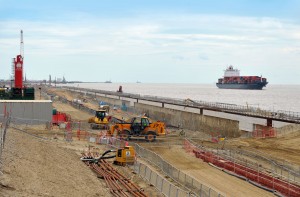Archives
Business, Feature, Freight News, Logistics, Sea
DB Schenker commits to London Gateway
[ July 3, 2012 // Chris ]DB Schenker has become the first rail operator to sign an agreement to operate services to and from the new London Gateway port, when it opens towards the end of next year. The German-owned rail operator, which already has a range of services at other UK maritime gateways, will initially operate a minimum of four return trips a day, although there is the potential to operate up to 30-35 services a day when the port and its associated logistics terminal is in full operation.
DB Schenker Rail UK’s managing director for logistics, Carsten Hinne said he was still in discussion with London Gateway’s owner, DP World, on where the services would go, but pointed out that his company already owned and operated terminals in the Midlands, North-west, Yorkshire and Scotland and that this “would shape the product to some degree.” He added that with the London Gateway development to include a major logistics park, which was in turn likely to attract some of the world’s biggest logistics operators, it was possible that DBS would consider developing services to and from the Continent; London Gateway was likely to be the UK’s busiest rail freight terminal, said DBS.
The existing single track line into the site, originally built to serve the local refining industry, has been pulled out and parts of it obliterated, but work is about to start on building a 5-mile double-track line into the port area.
DP World London Gateway chief executive officer, Simon Moore said that the plan was for rail to handle around 35% of box movements to and from the new port, “and we would have the capacity to do that.” As a large part of the new gateway’s traffic would be destined for London, only 25 miles away and thus unlikely to use rail, this implied that rail would have a much larger share of longer-distance movements to and from the Midlands, Northern England and Scotland.
Finding capacity from the Tilbury to London rail line to the north of London is an issue. However,improvement of the direct rail route from Felixstowe to the Midlands via Nuneaton would lessen that port’s dependence on the routes to the North of London to reach the Midlands, and free up more train paths for traffic to and from London Gateway, it was argued.
He added that while DBS is the first operator to sign up to use London Gateway, it was an open access port and other operators would also be free to operate services. There was also the possibility of coastal feeder services to other UK ports; indeed, as ship operators introduced more ships of around 18,000teu over the next few months, feeder services were likely to become an increasingly important part of liner shipping operations as shipowners concentrated operations on fewer ports.
Simon Moore said that at least one shipping line customer had also signed up to use London Gateway but that its identity would remain confidential for the time being.
Tags: DB Schenker, London Gateway












